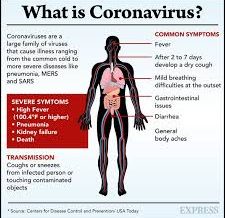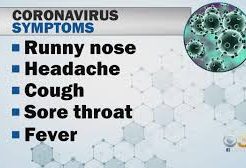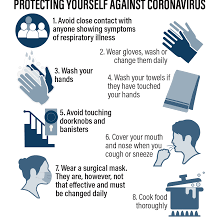1. WHAT IS CORONAVIRUS?
Coronaviruses are a huge family virus with four human viruses causing mild colds in all age groups. The virus seems like it has a crown, hence the name. The family also consists of viruses from animals that can infect human beings in a process called zoonosis. This form of infection has caused severe pneumonia and death, such as the new virus coronavirus (COVID-19). Previously, we’ve seen similar disease with the Severe Acute Respiratory Virus (SARS) and the Middle East Respiratory Syndrome Coronavirus Virus (SARS) viruses. COVID-19 started out inside the metropolis of Wuhan inside the Hubei area of China however it has currently spread to nearby nations consisting of South Korea, Iran & Italy. Isolated cases who’ve been affected abroad had been imported to other countries.

2. HOW DOES CORONAVIRUS INFECT?
The authentic new coronavirus contamination probably came from an animal and infected human being. Now it infects human beings via sneezing and coughing, however also through contact with virus-infected surfaces.
3. WHAT ARE THE SYMPTOMS?
Common symptoms are respiratory symptoms with fever, fatigue, cough and very rapid or laboured breathing. Severe symptoms may include pneumonia, severe acute respiratory syndrome, renal failure and death.

Symptoms
4. WHAT SHOULD YOU BE AWARE OF IF YOU ARE AFRAID OF GETTING INFECTED?
It is an acute infection with common cold symptoms. If you have been in contact with someone who may be infected, you should contact the health care system and ask for advice if you suspect infection and especially if you have rapid or laboured breathing.

Precautions
5. WHAT PRECAUTIONS SHOULD YOU TAKE IF YOU ARE TRAVELING OR GOING TO ONE OF THE COUNTRIES WHERE THE VIRUS HAS BEEN DETECTED?
Avoid close contact with sick people with fever and respiratory symptoms. Wash your hands frequently with soap and water or alcohol-based hand infection. Good cough and nose hygiene is also important, by covering your mouth and nose with paper towels or the elbow. Discard the handkerchief and wash your hands afterwards. Avoid close contact with animals and markets that sell animals and fresh produce. It is important food is sufficiently cooked or fried and follow good food hygiene.
6. WHO DIES OF THE NEW CORONAVIRUS?
Approximately 14 per cent of the infections are serious, and about 5 per cent of cases are critical. Of the cases in Hubei approx. 2.3 per cent have died of pneumonia, but half of these are patients who have had a critical illness and often are older patients with underlying disease. The mortality rates are lower in the rest of the world at 0.3 per cent. Many patients who experience severe disease have Diabetes, pulmonary disease or other chronic diseases and in the Hubei region, approximately 4 per cent of cases were in front line healthcare workers.
7. WHAT IS THE DEFINITION OF A PANDEMIC?
A pandemic is a major worldwide epidemic, where an infectious disease spreads in several parts of the world.
8. WHAT IS THE RISK OF THE NEW CORONAVIRUS CAUSING A PANDEMIC?
Neither SARS nor MERS developed into pandemics, but we have seen the situation change rapidly with COVID-19 and the WHO has recently declared a so-called public health emergency of international concern (PHEIC). This means that experts from around the world work together to identify outbreaks, share virus knowledge and inform each other about treatment. For the outbreak to develop into a pandemic, it must be a virus that spreads easily from person to person, across all regions around the world. We are getting closer to this point with the current situation.
9. SHOULD YOU AVOID TRAVELING TO THE COUNTRIES WHERE THE INFECTION HAS BEEN DETECTED?
There are no precise drugs or vaccines towards the new coronavirus. Therefore, one ought to remember suspending tour to inflamed areas. As the situation is converting hastily, it is pleasant to maintain up to date with the World Health Organization (WHO) Travel Advice and the Nigerian government.
BE SAFE OUT THERE.


Recent Comments